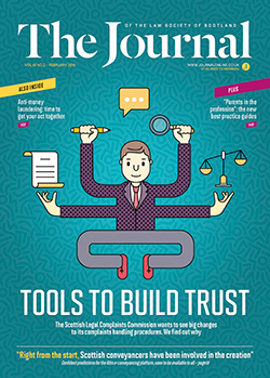Rape terms before the appeal court

Sentencing in rape cases
In HM Advocate v Cooperwhite [2013] HCJAC 88 (see Journal, August 2013, 26), Lord Carloway stated his intention to review sentencing in rape cases at a suitable opportunity. A number of such cases have been dealt with by the appeal court in recent months and guidance has been issued on sentence.
Laird v HM Advocate [2015] HCJAC 90 (14 October 2015) held that an order for lifelong restriction was not excessive where the appellant had been convicted of the sexual abuse of five previous partners over a period of 18 years, including charges of raping three of them.
In A v HM Advocate [2015] HCJAC 105 (18 November 2015) the appellant’s sentence was reduced from 16 years to 12 on appeal. He was a first offender but had raped his teenage daughter and subsequently her friend of a similar age. Consecutive sentences of 10 years and six years were reduced to eight and four respectively to take account of the delay in the appellant being charged by the police in September 2010 but not appearing on petition until April 2013 or being tried until March 2015, and of the overall length of sentence.
In Climent v HM Advocate [2015] HCJAC 92 (8 October 2015) the appellant was convicted of offences against three former partners over a period of 10 years. He had a previous record of domestic assaults. He was convicted of raping one of the complainers on two separate occasions and various assaults and breaches of the peace towards the other complainers. Following a successful appeal against conviction of one rape, his extended sentence of 13 years was left undisturbed but the custodial element was reduced from eight to seven years.
There was a Crown appeal in K v HM Advocate [2015] HCJAC 114 (26 November 2015), where an extended sentence of seven years was increased to 12 years with the custodial element upped from five years to eight. The appellant had been convicted of offences against two of his former partners and their two children, including rape, anal rape and lewd practices. The children, a boy aged nine or 10 at the time and a girl aged between 12 and 14, had been subjected to lewd practices and the boy repeated oral penetration and attempted sodomy. The appellant was regarded as a serious threat to women with young children, and the sentence increase was to take account of the fact that he would be in his early 50s when eligible for parole.
Finally, in HM Advocate v B [2015] HCJAC 106 (18 November 2015), another Crown appeal against sentence, the appellant’s sentence of three years’ imprisonment for the oral rape of a 14-year-old girl was increased to five years. Lord Carloway noted the change in the definition of rape brought about by the Sexual Offences (Scotland) Act 2009, and sentencing developments in England & Wales following the publication there of the Sexual Offences Definitive Guideline which suggested a similar penalty for an offence of this type. It cannot be presumed that oral rape will attract a lesser sentence than vaginal rape – the sentencer has to consider all the circumstances, including the level of violence used, the relationship between the parties, the age or vulnerability of the victim and the degree of harm caused.
The Sheriff Appeal Court
The new Sheriff Criminal Appeal Court has been up and running since last September and its decisions are now appearing on the SCS website.
The first published opinion, Robertson v Procurator Fiscal Stirling [2015] SAC (Crim) 1 (4 November 2015), was somewhat controversial in that the decision appeared to differ from what was previously regarded as the settled position of the High Court. Hitherto, if an accused was sentenced to a term of imprisonment but had previously spent a period on remand which had been interrupted prior to sentence, then the sentencer having regard to the time spent in custody in terms of the Criminal Procedure (Scotland) Act 1995, s 210(1), would normally double the number of days spent in custody and deduct them from the overall sentence: Martin v HM Advocate 2006 SCCR 683; Simpson v HM Advocate 2008 SCCR 126. In this way account would be given to time automatically taken off short sentences by s 1(1) of the Prisoners and Criminal Proceedings (Scotland) Act 1993.
Robertson appealed against a total sentence of 354 days which arose from consecutive sentences imposed in respect of two complaints. The first sentence, for a domestic breach of the peace, amounted to 119 days, being a headline sentence of six months’ imprisonment reduced by 20% reflecting a plea tendered at the intermediate diet (giving 145 days, 45 of which reflected that the offence had occurred in breach of bail), from which a further 26 days were subtracted to cover an earlier period spent on remand.
The other complaint involved two charges of assault committed when three bail orders were in force. A consecutive sentence of 235 days was imposed, arising from a headline sentence of 12 months’ imprisonment, discounted by 25% as the pleas had been tendered at the intermediate diet and then reduced by the 37 days said by the defence agent to have been spent on remand prior to sentence. In fact the remand period lasted only 27 days.
The appeal against sentence was unsuccessful due to the appellant’s previous record of violence. The court considered that the discount of 20% had possibly been overgenerous due to the appellant’s failure to appear at an earlier diet. The court did not interfere with the discretion used by the sheriff in taking account of the periods of remand, particularly when erroneous information had been given and the sheriff had applied the approach sought for the appellant. It highlighted that Martin is not authority for an absolute or rigid approach to dealing with periods on remand but reminds sentencers that prisoners sentenced to short periods of imprisonment are subject to release at the halfway period.
Dangerous, not careless driving
Falling asleep at the wheel can result in a conviction for dangerous rather than careless driving.
The case of Alexander v PF Edinburgh [2016] HCJAC 3 (19 January 2016) is a reminder that falling asleep at the wheel may result in the court holding that the driving fell far below what would be expected of a careful and competent driver and would be regarded more seriously than careless driving.
The appellant had been up since 6am and had worked a shift as a community staff nurse and visited her mother before falling asleep at the wheel on the way home about 5pm. Her vehicle had crossed the central reservation and collided with an oncoming car, injuring its passengers. The act of falling asleep, in the absence of special circumstances, is a voluntary act and when it occurs in the context of driving, will usually be regarded as dangerous. Drivers are always aware they are feeling sleepy and they may reach the point when they are fighting sleep and have ignored the obvious dangers if they continue to drive. In other cases there may be special circumstances which make falling asleep involuntary, such as sleep apnoea, but where the driver knows of such a medical condition and can foresee falling asleep at the wheel they will be precluded from relying on that condition. Where any such defence is advanced it would be for the Crown to establish that the act of driving was voluntary because the special circumstances ought to have been foreseen. The appeal was refused and the conviction for dangerous driving upheld.
Reasonable excuse
Lunn v HM Advocate [2015] HCJAC 103 (15 October 2015) concerned reasonable excuse for the possession of an offensive weapon. The appellant was charged with breach of the peace, two assaults and possession of a broken bottle. After trial she was convicted of one assault, involving punching under provocation, and the offensive weapon charge. She was acquitted of an assault involving a broken bottle having relied on a special defence of self-defence.
It was accepted by the Crown that the jury had been misdirected. Clearly where someone takes possession of an offensive weapon in anticipation or fear of future violence, that would not constitute a reasonable excuse; however if possession of the item is taken during an incident where the person is under attack or to prevent or discourage further violence, that would amount to having a reasonable excuse. The conviction on the possession charge was quashed.
In this issue
- A trainee perspective on leadership
- Beyond the Bribery Act
- Legal IT: the potential of blockchains
- Directors: the parent over your shoulder
- Ten for starters
- Reading for pleasure
- Journal magazine index 2015
- Opinion: Daniel Donaldson
- Book reviews
- Profile
- President's column
- The big 4-0-0 approaches
- People on the move
- Balance in redress
- Pension allowances: the last chance
- E-conveyancing: the real deal
- Deeds of conditions: not dead yet
- Anti-money laundering: a call to action
- New challenges, new CEO
- Rape terms before the appeal court
- Another year of change
- Defending the abduction
- The right to snoop?
- Fond farewell
- Scottish Solicitors Discipline Tribunal
- Dilapidations: enforcing the bargain
- Title out of nothing
- Charged and ready
- Updates from the OPG
- The family way
- Conflict of interest: the questions still come
- Seeking growth
- Fraud: a battle of wits
- Light to a Safe Harbour
- Through the client's eyes
- Ask Ash
- Law reform roundup






